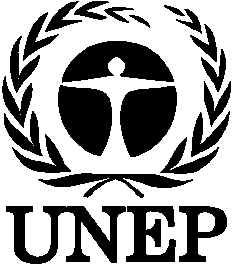

Environment
Programme
GENERAL
UNEP/POPS/INC.1/INF/6
30 April 1998
ORIGINAL: ENGLISH
Click here to download the original document: WordPerfect or MS-Word
| UNITED NATIONS |
EP |
|
United Nations Environment Programme
|
Distr. GENERAL UNEP/POPS/INC.1/INF/6 ORIGINAL: ENGLISH |
INTERGOVERNMENTAL NEGOTIATING COMMITTEE FOR AN
INTERNATIONAL LEGALLY BINDING INSTRUMENT FOR
IMPLEMENTING INTERNATIONAL ACTION ON
CERTAIN PERSISTENT ORGANIC POLLUTANTS
First session
Montreal, 29 June-3 July 1998
PREPARATION OF AN INTERNATIONAL LEGALLY BINDING INSTRUMENT
FOR IMPLEMENTING INTERNATIONAL ACTION ON
CERTAIN PERSISTENT ORGANIC POLLUTANTS
Resolution WHA50.13, on the promotion of chemical safety, with special
attention to persistent organic pollutants, adopted by the Fiftieth
World Health Assembly, held in Geneva, 5-14 May 1997
Note by the Secretariat
The Secretariat has the honour to transmit to the Intergovernmental Negotiating Committee, in the annex to the present note, the text of resolution WHA50.13, adopted by the fiftieth World Health Assembly, held in Geneva, 5-14 May 1997. The text of the resolution is attached as submitted by the secretariat of the World Health Organization (WHO) and has not been formally edited.
Annex
FIFTIETH WORLD HEALTH ASSEMBLY GENEVA,
5-14 MAY 1997
RESOLUTIONS
WHA50.13 Promotion of chemical safety, with special attention to persistent organic pollutants
The Fiftieth World Health Assembly,
Having considered the report of the Director-General on persistent organic pollutants;
Recalling resolutions WHA30.47 , WHA31.28 and EB63.R19 on the evaluation of the effects of chemicals on health, and resolutions EB73.R10 and WHA45.32 on the International Programme on Chemical Safety;
Noting that the Director-General established in May 1996 a steering committee on sound management of chemicals to coordinate activities related to chemical safety;
Noting that the Memorandum of Understanding between UNEP, ILO and WHO concerning collaboration in the International Programme on Chemical Safety was renewed in 1996;
Noting that, in response to the call of the United Nations Conference on Environment and Development (UNCED) for improved international cooperation on sound management of chemicals, an Inter-Organization Programme for the Sound Management of Chemicals was established in 1995 with six participating organizations (UNEP, ILO, FAO, WHO, UNIDO and OECD), and that WHO is the administering organization;
Noting that, in response to a recommendation made at UNCED and to resolution WHA46.20, an intergovernmental forum on chemical safety was established in 1994 with WHO as the host agency,
1. ENDORSES the recommendations of the Intergovernmental Forum on Chemical Safety to the Health Assembly on persistent organic pollutants, as presented in the report of the Director-General;
2. CALLS UPON Member States:
(1) to involve appropriate health officials in national efforts to follow up and implement decisions of the UNEP and WHO governing bodies relating to the currently identified persistent organic pollutants;
(2) to ensure that scientific assessment of risks to health and the environment is the basis for the management of chemical risk;
(3) to continue efforts to establish or reinforce national coordinating mechanisms for chemical safety, involving all responsible authorities as well as the nongovernmental organizations concerned;
(4) to take steps to reduce reliance on insecticides for control of vector-borne diseases through promotion of integrated pest-management approaches in accordance with WHO guidelines, and through support for the development and adaptation of viable alternative methods of disease vector control;
(5) to establish or strengthen governmental mechanisms to provide information on the levels and sources of chemical contaminants in all media, and in particular in food, as well as on the levels of exposure of the population;
(6) to ensure that the use of DDT is authorized by governments for public health purposes only, and that, in those instances, such use is limited to government-authorized programmes that take an integrated approach and that strong steps are taken to ensure that there is no diversion of DDT to entities in the private sector;
(7) to revitalize measures for training and for increasing public awareness in collaboration with intergovernmental and nongovernmental organizations, in order to prevent poisonings by chemicals and, in particular, pesticides;
3. REQUESTS the Director-General:
(1) to participate actively in the intergovernmental negotiating committees on the currently identified persistent organic pollutants, in the drafting of a legally binding instrument for the "prior informed consent" procedure, and in other intergovernmental meetings on issues requiring health expertise, in particular those relating to the use of pesticides for vector control, in order to ensure that international commitments on hazardous chemicals are realistic and effective and that they protect human health and the environment;
(2) to support research on integrated approaches to the control of vector-borne diseases, including environmental management, and involving appropriate WHO collaborating centres in this effort;
(3) to continue to support the acceleration and expansion of WHO’s activities for the assessment of chemicals risk as a basis for national decision-making on its management, including the joint FAO/WHO programmes on food additives and contaminants and veterinary drug residues and on pesticide residues;
(4) to cooperate with Member States in facilitating the exchange of information on chemicals utilizing modern technology, especially in the collation and provision of reliable and comparable data, in particular from developing countries, on human exposure, incidents of poisonings and other adverse health effects;
(5) to take the necessary steps to reinforce WHO’s leadership in undertaking risk assessment as a basis for tackling high-priority problems as they emerge, and in promoting and coordinating related research, for example, on potential endocrine-related health effects of exposure to chemicals and on the possible causal links with cancer and reproductive, neurological and immunological disorders;
(6) to continue efforts to enhance technical cooperation with Member States for the determination of their capacity-building needs, and for the implementation of programmes for the management of chemicals risk, in collaboration with participants in the Inter-Organization Programme for the Sound Management of Chemicals and with other organizations;
(7) to report on the outcome of the deliberations at the Health Assembly to the UNEP Governing Council;
(8) to report to a future Health Assembly on progress in implementing this resolution.
Hbk Res., Vol. III (3rd ed.), 1.14.4(Eighth plenary meeting, 12 May 1997 - Committee B, second report)
-----